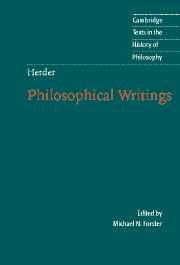Book contents
- Frontmatter
- Contents
- Introduction
- Chronology
- Further reading
- Note on the texts and translation
- Part I General Philosophical Program
- Part II Philosophy of Language
- Part III Philosophy of Mind
- Part IV Philosophy of History
- On the Change of Taste (1766)
- Older Critical Forestlet (1767/8) [excerpt on history]
- This Too a Philosophy of History for the Formation of Humanity [an early introduction]
- This Too a Philosophy of History for the Formation of Humanity (1774)
- Part V Political Philosophy
- Index
- Cambridge texts in the history of philosophy
On the Change of Taste (1766)
Published online by Cambridge University Press: 05 June 2012
- Frontmatter
- Contents
- Introduction
- Chronology
- Further reading
- Note on the texts and translation
- Part I General Philosophical Program
- Part II Philosophy of Language
- Part III Philosophy of Mind
- Part IV Philosophy of History
- On the Change of Taste (1766)
- Older Critical Forestlet (1767/8) [excerpt on history]
- This Too a Philosophy of History for the Formation of Humanity [an early introduction]
- This Too a Philosophy of History for the Formation of Humanity (1774)
- Part V Political Philosophy
- Index
- Cambridge texts in the history of philosophy
Summary
On the diversity of taste and of manner of thought among human beings
As soon as I find something true or beautiful, as soon as I can convince myself by means of reasons that something is true or beautiful, then nothing is more natural than the expectation that every human being will have the same feeling, the same opinion, with me. Otherwise, of course, there would be no basic rule of truth and no firm basis for taste. As soon as it is shown that what I on the basis of reasons take to be true, beautiful, good, pleasant can likewise on the basis of reasons be regarded by another as false, ugly, bad, unpleasant, then truth, beauty, and moral value is a phantom that appears to each person in another way, in another shape: a true Proteus who by means of a magic mirror ever changes, and never shows himself as the same.
That this contradiction has real weight and not merely superficial sparkle: Let us observe how annoyed and dismayed those people become to whom it suddenly presents itself in an unusual light. A good, honest man who only knows the world from the market-place, from the coffeehouse, and at most out of the Hamburg Correspondent is as amazed when he comes upon a story and discovers that manner of thought and taste change with climate, with regions of the earth, and with countries – I say, he is as amazed as Paris can ever be astonished at the arrival of an Indian prince.
- Type
- Chapter
- Information
- Herder: Philosophical Writings , pp. 247 - 256Publisher: Cambridge University PressPrint publication year: 2002
- 1
- Cited by



